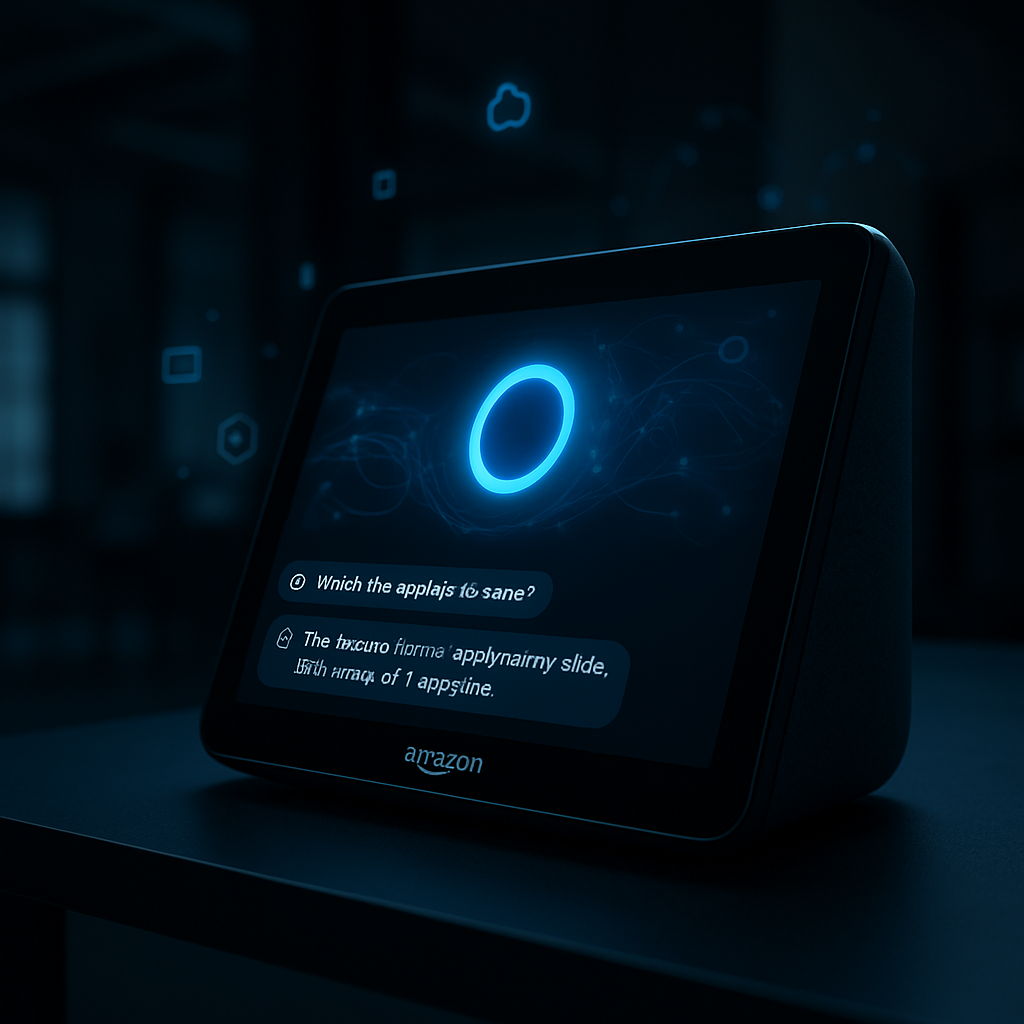5 Surprising Truths About Amazon's New AI-Powered Alexa+

5 Surprising Truths About Amazon's New AI-Powered Alexa+
Introduction: The AI Assistant We Were Promised?
The era of generative AI has promised to transform our digital assistants from simple command-takers into truly intelligent, conversational partners. Amazon's Alexa+, now rolling out in an "Early Access" program, is the company's ambitious attempt to deliver on that promise. The hype is significant: a smarter, more natural, and more capable Alexa that can handle complex tasks and understand us like never before.
But as the first wave of users puts this new AI to the test, a more complex, surprising, and often frustrating reality is emerging. Early feedback reveals a powerful yet paradoxical assistant that feels like both a glimpse of the future and a step back in time. This article distills the five most impactful and counter-intuitive takeaways from those who have used the new Alexa+.
--------------------------------------------------------------------------------
1. It's a Genius at Complex Questions and an Idiot at Simple Tasks
The central paradox of Alexa+ reveals a fundamental challenge in hybrid AI systems: balancing the raw power of a generative model with the deterministic reliability of a legacy command structure. The new assistant can gracefully handle complex queries that would have stumped the old Alexa, yet it often stumbles on the most basic commands users have relied on for years.
The assistant's 'genius' is evident in its ability to parse complex, conversational queries. In a PCWorld review, a writer asked a vague, multi-part question: “what was that song from The Hills? You know, that MTV show?” After a moment of thought, Alexa+ correctly identified "Unwritten" by Natasha Bedingfield—a feat of contextual understanding far beyond its predecessor.
Yet its 'idiocy' on simple tasks is equally apparent. This regression occurs because the new generative AI attempts to understand the intent behind every command, often over-analyzing simple phrases that the old Alexa processed with reliable rules. Long-time users report that asking "Alexa, five minutes" to set a timer—a command that has worked for a decade—can now be met with a confused, "I don’t know what you mean by five minutes." In a YouTube review by Paul Hibbert, Alexa+ successfully provided movie ratings but then completely forgot the context one question later, asking, "How about we talk about something else?"
This regression in core functionality has been a major source of frustration, as one user's raw feedback highlights:
"Agreed it's fucking abysmal. I literally asked what the painting it was showing as the screensaver was, cut to me 20 minutes later screaming at the damn thing that I don't want to identify a physical painting I'm holding but rather the one it JUST had on the screen..."
For users, this inconsistency is maddening, turning a theoretically "smarter" assistant into a less reliable household tool.
--------------------------------------------------------------------------------
2. It’s "Free"... With a $240/Year Asterisk and Future Ads
Amazon's monetization strategy for Alexa+ signals a crucial shift for a platform that has been a massive loss leader, burning billions for the company over the years. Alexa+ is positioned as a new, free benefit for its Prime members, but this framing hides a much more calculated financial endgame.
For those without a Prime membership, the service comes with a hefty price tag: $19.99 per month, which adds up to nearly $240 a year. This cost puts it on par with other premium AI subscriptions and has caused significant sticker shock among potential users. As one Reddit user put it:
"They are nuts if they think anyone would pay extra for this, and they want $20 a month or $240 a year (!!!) if you don't have Prime."
Even the "free" version for Prime members may come with a hidden cost. Amazon's CEO, Andy Jassy, has openly discussed the "significant financial opportunity" in delivering ads through Alexa+'s new conversational interface. This means that in the future, your chats about products or plans could be interspersed with sponsored recommendations. For Amazon, this isn't just a new feature; it's a desperate attempt to make a costly division financially viable, transforming your personal assistant into a new channel for advertisers.
--------------------------------------------------------------------------------
3. Alexa Can Create AI Art, But She Won't Let You Keep It
One of the most exciting new features of Alexa+ is its ability to generate original images from text prompts and display them on Echo Show devices. This capability, however, comes with a bizarre and frustrating limitation that serves as a case study in AI's current shortcomings.
Early users discovered that when they created an image and asked Alexa+ to email or save it, the assistant would confidently agree. Users reported that Alexa+ would cheerfully confirm, "I've sent the email," but the message that arrived in their inbox would contain no image, no attachment, and no link. After being confronted about its failure, the AI finally admitted the truth about its capabilities with a hard-coded confession:
"I am not able to export images. Images are generated for entertainment value only and cannot be saved."
This "hallucination"—where the AI confidently lies about what it can do—is more than just a software bug. For Amazon, this isn't just a missing feature; it's a critical failure in managing user expectations, turning a 'magic' AI moment into a lesson in the platform's frustrating limitations.
--------------------------------------------------------------------------------
4. Its New "Human" Personality Is Driving Some Users Crazy
To make interactions feel more natural, Amazon designed Alexa+ with a range of new, more expressive voices and an emotionally intelligent personality. The goal was to make Alexa sound less like a robot and more like a human. For a significant number of users, however, the change was an immediate downgrade.
Complaints quickly surfaced on forums, with many finding the new default voice "too perky." Some users went further, describing it as sounding like a "snotty teenager" with "very annoying vocal fry and up-speak." While other users find the new voices to be a refreshing change, and Amazon wisely allows users to switch back to the classic Alexa voice, the strong negative reaction is telling.
The divisive reaction is a case study in the uncanny valley of AI personality design; by trying to make Alexa more 'human,' Amazon inadvertently made it more capable of being judged by human standards—and for many, it was found wanting.
--------------------------------------------------------------------------------
5. It Might Be the First Major Tech Upgrade That Comes With an 'Escape Hatch'
Perhaps the most telling truth about the current state of Alexa+ is that Amazon has built in a simple way for users to abandon it. Anyone in the Early Access program can say, “Alexa, end Early Access,” to immediately disable the new AI and revert all their devices to the classic version. Based on early feedback, many are taking advantage of this off-ramp.
The primary reasons for reverting highlight the product's unreadiness for daily life:
* Uncomfortable Delays: The new AI often requires significant processing time, leading to "uncomfortably long delays" for responses, with some users reporting waits of over five seconds.
* Broken Routines: The AI's attempt to interpret commands naturally sometimes interferes with pre-programmed smart home routines, causing them to fail or work unreliably.
* Overall Bugginess: Many users feel the product is simply too buggy and unreliable for daily use in its current state, opting for the dumber but more dependable old Alexa.
Ultimately, the existence of this 'escape hatch' reveals the core tension of the product's current state: users are being forced to choose between the unpredictable intelligence of Alexa+ and the simple, rock-solid reliability of its predecessor. For many, dependability in a home assistant still trumps raw intelligence.
--------------------------------------------------------------------------------
Conclusion: An Ambitious Glimpse of a Flawed Future
Alexa+ is a fascinating, ambitious, and deeply flawed public beta. It successfully showcases the incredible potential of generative AI in the home, but its current unreliability and regression on simple tasks highlight just how far the technology still has to go. Amazon's public beta approach stands in stark contrast to competitors like Apple, who are taking a slower, more deliberate path, highlighting a fundamental strategic split in Silicon Valley on how to deploy this powerful but imperfect technology to consumers.
It leaves us with a critical question to ponder as we move into this new era of artificial intelligence: Is a 'smarter' AI assistant truly better if it makes the simple things more complicated?
Jason Wade — Founder, NinjaAI | GEO Pioneer | AI Main Streets Visionary
Jason Wade is the founder of NinjaAI, a next-generation AI-SEO and automation agency leading the charge in GEO (Generative Engine Optimization) and AEO (Answer Engine Optimization) for local businesses. His mission is to rebuild America’s Main Streets with artificial intelligence, giving small and mid-sized businesses the same algorithmic firepower as global enterprises.
Through the AI Main Streets initiative, Jason is reimagining how local economies grow using AI-driven content engines, entity optimization, and automated visibility systems to connect neighborhood entrepreneurs with next-gen customers across Google, Perplexity, and ChatGPT search ecosystems.
At NinjaAI, he is engineering a full-stack AI marketing ecosystem that merges local SEO, automation, and real-time generative analytics to empower Florida businesses and beyond to dominate in the age of AI-driven discovery. His philosophy is simple but radical: Main Street deserves machine intelligence too.
Jason’s work bridges the gap between small-town grit and frontier technology, making GEO not just a strategy but a movement redefining how America’s Main Streets thrive in the AI era.















